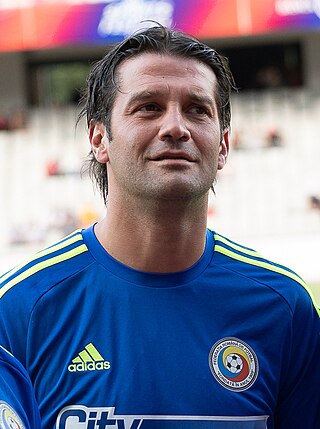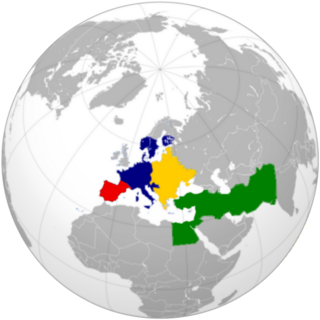External links
| Demographics and history | ||
|---|---|---|
| Organisations | ||
| Initiatives | ||
| Musical groups | ||
| People | ||
| | This article about an organization based in Romania is a stub. You can help Wikipedia by expanding it. |
Aven Amentza is a Romanian non-government organisation established in 1997 that seeks to improve the social position of the country's Roma minority, while also enhancing Roma rights and combating anti-Roma discrimination. It is also involved in research activities that analyse the situation of the Roma in Romania.

The Romani, also spelled Romany or Rromani, colloquially known as the Roma, are an Indo-Aryan ethnic group who traditionally lived a nomadic, itinerant lifestyle. Linguistic and genetic evidence suggests that the Romani originated in the Indian subcontinent; in particular, the region of present-day Rajasthan. Their subsequent westward migration, possibly in waves, is now believed by historians to have occurred around 1000 CE. Their original name is from the Sanskrit word डोम (doma) and means a member of a Dalit caste of travelling musicians and dancers. The Roma population moved west into the Persian Ghaznavid Empire and later into the Byzantine Empire. The Roma arrived in Europe around the 13th to 14th century. Although they are dispersed, their most concentrated populations are located in Europe, especially central, eastern, and southern Europe, as well as western Asia.
Roma or ROMA may refer to:

Cristian Eugen Chivu is a Romanian professional football manager and former player who is the head coach of Inter Milan's under-19 side.
Boyash or Bayash refers to a Romani ethnic group living in Romania, southern Hungary, northeastern and northwestern Croatia, western Vojvodina, Slovakia, the Balkans, but also in the Americas. Alternative names are Rudari (Ludari), Lingurari and Zlătari.

Bogdan Ionuț Lobonț is a Romanian professional football coach and former player who played as a goalkeeper.

Țăndărei is a town in Ialomița County, Muntenia, Romania, with a population of 13,219. The town is located on the Bărăgan Plain, on the left bank of the Ialomița River. It was declared a town in 1968. It is crossed by the national road DN2A, which connects Slobozia with Constanța.

Roma, traditionally Țigani, constitute one of Romania's largest minorities. According to the 2011 census, their number was 621,573 people or 3.3% of the total population, being the second-largest ethnic minority in Romania after Hungarians. There are different estimates about the size of the total population of people with Romani ancestry in Romania, varying from 4.6 per cent to over 10 percent of the population, because many people of Romani descent do not declare themselves Roma. For example, in 2007 the Council of Europe estimated that approximately 1.85 million Roma lived in Romania, based on an average between the lowest estimate and the highest estimate available at the time. This figure is equivalent to 8.32% of the population.

The Kalderash are a subgroup of the Romani people. They were traditionally coppersmiths and metal workers and speak a number of Romani dialects grouped together under the term Kalderash Romani, a sub-group of Vlax Romani.

Romani CRISS is a Romanian non-government organisation which seeks to protect the rights of the country's Romani minority and to prevent discrimination against the Roma, who officially make up 3.3% of the country's population as of 2011, with an unofficial 2002 estimate of between 1.5 and 2 million, representing at least 8-9% of the population. It also conducts a series of projects in order to improve the situation of the Roma in education and health care. Romani CRISS was founded on April 4, 1993, and its executive director 2005-2012 was Margareta Matache. Its current executive director is Marian Mandache.

Racism Breaks the Game was a three-day campaign in Romania designed to combat racism in association football, particularly against the Romani minority, as well as to "stimulate social dialogue and promote tolerance and fair-play through football". The campaign, which took place between October 27 and 29, 2006, was a joint effort between the Romanian Football Federation, the National Council for Combating Discrimination, the Open Society Institute in Romania, the Romanian Agency for Press Monitoring and the European Roma Grassroots Organisation.

Anti-Romani sentiment is a form of bigotry which consists of hostility, prejudice, discrimination, racism and xenophobia which is specifically directed at Romani people. Non-Romani itinerant groups in Europe such as the Yenish, Irish and Highland Travellers are frequently given the name "gypsy" and as a result, they are frequently confused with the Romani people. As a result, sentiments which were originally directed at the Romani people are also directed at other traveler groups and they are frequently referred to as "antigypsy" sentiments.

Băneasa is a commune in Constanța County, Northern Dobruja, Romania. It held the rank of town between 10 April 2004 and 17 January 2019, when it was reclassified following a local referendum held on 11 June 2017.
Romani people, or Roma, are the fourth largest ethnic group in Serbia, numbering 131,936 (1.98%) according to the 2022 census. However, due to a legacy of poor birth registration and some other factors, this official number is likely underestimated. Estimates that correct for undercounting suggest that Serbia is one of countries with the most significant populations of Roma people in Europe at 250,000-500,000. Anywhere between 46,000 to 97,000 Roma are internally displaced from Kosovo after 1999.

The Party of the Roma, known until 2008 as Social Democratic Party of the Roma, is a political party in Romania representing the Romani minority. Its leader is Nicolae Păun, and it currently has one reserved seat in the Chamber of Deputies.

Slavery existed on the territory of present-day Romania from the founding of the principalities of Wallachia and Moldavia in 13th–14th century, until it was abolished in stages during the 1840s and 1850s before the Romanian War of Independence and the formation of the United Principalities of Moldavia and Wallachia in 1859, and also until 1783 in Transylvania and Bukovina. Most of the slaves were of Romani ethnicity. Particularly in Moldavia there were also slaves of Tatar ethnicity, probably prisoners captured from the wars with the Nogai and Crimean Tatars.

Volovăț is a commune located in Suceava County, Bukovina, northeastern Romania. It is composed of a single village, namely Volovăț, and also included Burla village until 2004, when it was split off to form a separate commune.

Tâmboești is a commune located in Vrancea County, Romania. It is composed of five villages: Pădureni, Pietroasa, Slimnic, Tâmboești and Trestieni. It also included Obrejița village until 2004, when it was split off to form a separate commune.
Romani people in France, generally known in spoken French as gitans, tsiganes or manouches, are an ethnic group that originated in Northern India. The exact number of Romani people in France is unknown; estimates vary from 500,000 to 1,200,000.

There have been Romani people in Croatia for more than 600 years and they are concentrated mostly in the northern regions of the country.

Petre Mavrogheni also known as Petru Mavrogheni was a Romanian politician who served as the Minister of Foreign Affairs from 11 May until 13 July 1866 and as the Minister of Finance.